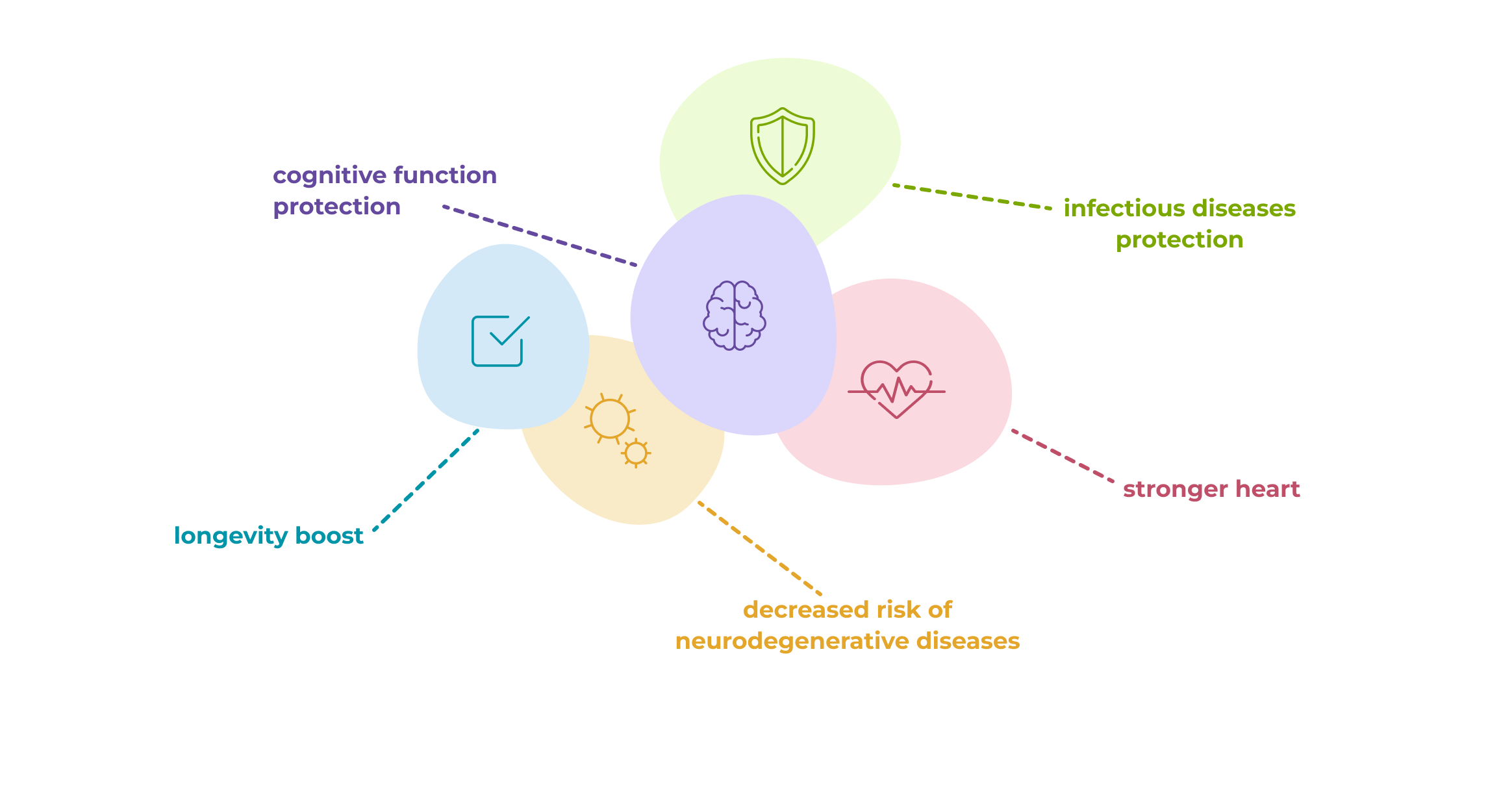Simple’s guide on autophagy: everything you need to know

Our bodies, being the wonderfully efficient machines that they are, have a kind of “self-cleaning” function called autophagy. The research is still very new, but there are some promising results that point to intermittent fasting and autophagy being a sort of health and wellness dream team.

Intermittent fasting may trigger the process of autophagy. And the intermittent fasting benefits we know and love (listed below) may actually be due to their connection with autophagy.[1]
Some of these fasting benefits are:
- weight loss, specifically from fat loss
- improved cognitive function
- reduced inflammation
- lower risk of metabolic syndrome
- improved heart health
- reduced risk of diabetes
Although intermittent fasting is considered safe in general, it’s not for everyone. Fasting should be avoided by those who:
- are pregnant or breastfeeding
- are under the age of 18, or 80 years old or more
- have a history of or are currently diagnosed with an eating disorder
- are underweight (BMI below 18.5)
- have a medical condition like type 1 diabetes
If you don’t fit into any of those categories, take our Simple quiz to see which schedule would work best for you. Then, read our intermittent fasting for beginners guide to get started.
Now that we have those basics out of the way, we’re ready to unpack today’s key questions, like what is autophagy, anyway? Let’s get started!

What is autophagy?
Autophagy (from the Greek words “auto,” meaning “self,” and “phagein,” meaning “eat”) is when the cells in our bodies eat themselves.[2] It sounds kind of gross, but it’s a good thing and a necessary process for cell health and rejuvenation. It begins at birth but can decrease as we age.
The cells in your body are made of many different parts. Sometimes, those parts get worn or damaged. The lysosomes are the cleaners of the cell. They will chew up damaged or foreign parts and either get rid of them or release reusable pieces back to the rest of the cell to be recycled.
This is a natural process, but it can malfunction, and a malfunctioning autophagy process has been associated with multiple diseases such as diabetes, Crohn’s, heart disease, and kidney disease, to name a few.[3] However, the relationship between autophagy and these diseases is complex and not completely understood. We’ll talk about this a little later.
The history of autophagy
Autophagy may sound like a fancy new scientific breakthrough, but it was discovered many years ago.
In the 1960s, a Belgian scientist was researching insulin and its effects on the liver when he noticed a cannibalistic process happening in some of the cells under his microscope.
Throughout the 90s, Japanese biologists identified the specific genes that manage the autophagy process. They found that these genes kickstart the autophagy process, and without them, our cells are unable to repair themselves.
Since then, more research continues to be done on the possible benefits of autophagy.
Why is it important?
Autophagy is a protective cellular process. It’s a preservation process.[4] Cells go into self-preservation mode, where they produce their own energy by “recycling” the damaged cell parts to help maintain overall health and function.
It plays a role in cellular homeostasis, removing dead or damaged cell components so that cells can maintain proper function and efficiency.[5] This keeps everything running normally, especially during times of stress (e.g.., infection, starvation, and recovery).
It also plays a role in cell protection by removing dead cells and damaged components, helping to contribute to overall cellular death.
Studies in animals and human cells have linked impaired autophagy to a few diseases, neurodegenerative disorders, and metabolic conditions that can all lead to a decline in cellular health.[4]
Autophagy benefits

Research in humans is non-existent, but there is plenty of animal and human cell data looking at autophagy. Researchers found that some of the benefits of autophagy seen in animals and human cells that may possibly apply to humans include:
- Fighting or preventing diseases
Autophagy removes health-threatening bacteria and other toxins. This can protect from the spread of infectious diseases.[4]
- Longevity
By helping to reduce disease risk, autophagy may lead not only to a longer life but a higher quality of life as well.[5]
- Protection of mental health and cognitive function
Neurodegeneration is the progressive damage of brain cells or the accumulation of damaged cell parts in the brain. By cleaning out those damaged cell parts, autophagy is thought to protect against neurodegenerative diseases.[6] It’s important to note that neurodegenerative diseases have complex causes, and autophagy is just one piece of the puzzle in their prevention or treatment.
Autophagy and diseases
The research on the role of autophagy and disease progression is based on animal and human cell research,[7] meaning it may not apply to you and me. There’s more research to be done especially in humans.
Some of our cells are for short-term use, but others — like the ones that make up our hearts and brains — are here for the long haul. Autophagy keeps those long-term cells clean and working well. Think of it like getting regular maintenance on your car so that it can keep going for miles and miles.
If autophagy isn’t happening or not functioning well, toxins and junk parts can be left in the cell. Malfunctioning cells aren’t disposed of, and in the case of cancer cells, they may mutate and multiply. On the other hand, autophagy may also play a part in recycling cancer cells, providing them with nutrients and teaching them to survive. This highlights that the relationship between autophagy and cancer is complex and not solely determined by autophagy malfunction. This is why if you have cancer, you should always speak with your doctor before starting a fasting program.
- Heart disease
As we age, autophagy becomes less efficient. This can lead to changes in the cells that regulate cardiac function. As a result, age-related cardiac disease can occur.[8] But it’s important to note that heart disease can increase with age due to conditions such as menopause and generally due to changes in diet and lifestyle.
- Brain health
Like our hearts, our brains have long-term cells that can get messy and toxic. Cell death is also possible as we age because the autophagy process is losing its oomph.[9] According to animal and human cell studies, this may increase your risk of neurodegenerative diseases.[10]
More research is being done in various disease scenarios to learn how to use the natural autophagy process to our advantage, as well as to possibly use it as a targeted, non-pharmaceutical approach for treatment and recovery.
What happens during the process of autophagy?
Autophagy is complex and intricate, but a simple way to think about autophagy is this four-step process:
- Sequestration. A dysfunctional or damaged component in the cell is identified and engulfed by a double membrane component called a phagophore. Together, this becomes an autophagosome.
- Transfer. The autophagosome is then joined to the lysosome, an important part of the cytoplasm in the cell, and the feasting begins.
- Protein degradation. The lysosome contains enzymes known as hydrolases that break down the junk components into reusable amino acids (the building blocks of proteins).
- Utilization. The newly formed amino acids can now be dispersed throughout the cells as a fuel source, or they can be used to make new proteins for:
- maintaining (in the case of long-term cells);
- rebuilding (for instance, muscle cells after a workout); or
- creating new cells (such as immunity cells).
What is autophagy caused by?
Autophagy is our body’s sustainability plan. It’s triggered by nutrient deprivation (fasting or starvation), oxygen deprivation (exercise), and damage (trauma or surgery).[4] It’s also worth noting that autophagy can also be influenced by various factors, including genetics, hormones, and cellular stress.
How to induce autophagy

You may be wondering, when does autophagy start? Well, it’s a naturally occurring process that may happen overnight while we’re asleep. It’s our body’s natural rejuvenation process.
So, if autophagy happens on its own — and with all of this talk about using it in a targeted way for disease prevention, treatment, and recovery — you may be curious about how to induce autophagy. Perhaps you’re asking the question, “How can I optimize the benefits of autophagy?”
To kickstart the autophagy process, you need nutrient deprivation [11] — specifically carbohydrates, your cells’ preferred energy source. Diets that cause the body to run low on carbohydrates, like the keto diet and intermittent fasting, can induce autophagy. Physical exercise can also cause your carb stores to run low.[12] Either one of these methods may trigger the proteins needed to tell your cells to begin producing their own energy.
Remember, the research is still out on whether autophagy is good or bad when it comes to disease prevention and treatment, so be sure to include your medical team in your plans.
Intermittent fasting and autophagy
Due to its caloric restriction, intermittent fasting can induce the autophagy process. In a recent study of young men completing a 17–19 hour fast, fasting was shown to be effective in increasing the number of cells that were triggered into the autophagy process.[1] Although this is not a direct measure of autophagy, the findings are exciting. Ultimately, we still need more of this research with a more diverse range of humans before making any conclusions.
Of course, the longer you fast, the more starvation will trigger that stress response in your cells. This stress response is part of your body’s adaptive mechanisms and may not necessarily be harmful especially when fasting is conducted safely. We recommend you take it slow and try our Simple quiz to figure out your best fasting match.
How long do I need to fast for autophagy to occur?
The benefits of intermittent fasting can be seen with as little as a 12-hour fast. As mentioned before, some of those benefits are thought to be due to the relationship between autophagy and fasting.[1] Although these benefits may be due to changes in what we eat or as a result of weight loss for those who are living with overweight or obesity.
It’s suggested that fasting anywhere between 24 and 36 hours can help trigger autophagy, but here at Simple, we don’t recommend such an extended fast without first getting the all-clear from your healthcare provider!
The 16:8 fasting schedule is our favorite for fasting in general. It’s short enough to be convenient and can easily fit into your schedule with little adjustment, and long enough to see the benefits of fasting without being so restrictive that it’s hard to get adequate nutrition, especially if you know what to eat during intermittent fasting. But everyone is different, and you can do the schedule that works best for you.
Is autophagy effective for successful weight loss?

We wouldn’t say “autophagy for weight loss” is really a thing. There isn’t a direct connection between the two.
In other words, fasting for autophagy and fasting to lose weight can be achieved with the same effort. Likewise, the exercise that triggers autophagy in skeletal muscle cells can lead to weight loss, specifically fat loss, which is better for overall metabolic health.[12]
Intermittent fasting and working out can be a one-two punch for both autophagy and weight loss goals. Remember to include health-promoting foods during your eating window to best support your goals.
Is extended fasting for autophagy safe?
Extended fasting (fasting for longer than 18 hours) can be done safely, but we wouldn’t recommend it. It’s difficult to stick to and much more risky. With longer fasting windows, adequate nutrient intake and proper hydration are harder to achieve, and you’re more prone to fall foul of intermittent fasting side effects. The research is just not there to support any more benefits from fasting for longer periods.
We always recommend you start slow, keep your doctor in the loop, stay hydrated (learn what you can drink while fasting here), and always listen to your body.
Side effects of autophagy
There’s still much research to be done, but so far, autophagy has been giving us mixed signals. We’ve talked about the benefits but only briefly touched on the risks. Let’s fix that by going a little more in-depth into specific risks.
From what we know so far, it seems like the main risks of autophagy stem from:
“Too much” autophagy
One study has shown cellular death from overdoing autophagy.[13] But, we need more research to confirm this finding and whether it was due to external circumstances.
Helping the wrong guys
Some cancer cells have been shown to benefit from autophagy.[14] In more advanced stages of cancer, autophagy can actually help the cancer cells by making them more efficient and resistant to therapies.[15]
Any other side effects that may be felt during autophagy — like fatigue, headaches, hunger, dizziness — are more accurately symptoms of the stressed state needed to trigger the autophagy process.


- Erlangga Z, Ghashang SK, Hamdan I, Melk A, Gutenbrunner C, Nugraha B. The effect of prolonged intermittent fasting on autophagy, inflammasome and senescence genes expressions: An exploratory study in healthy young males. Human Nutrition & Metabolism. 2023 Jun 1;32:200189.
- Condello M, Pellegrini E, Caraglia M, Meschini S. Targeting Autophagy to Overcome Human Diseases. Int J Mol Sci [Internet]. 2019 Feb 8;20(3).
- Glick D, Barth S, Macleod KF. Autophagy: cellular and molecular mechanisms. J Pathol. 2010 May;221(1):3–12.
- Aman Y, Schmauck-Medina T, Hansen M, Morimoto RI, Simon AK, Bjedov I, et al. Autophagy in healthy aging and disease. Nat Aging. 2021 Aug;1(8):634–50.
- Khandia R, Dadar M, Munjal A, Dhama K, Karthik K, Tiwari R, et al. A Comprehensive Review of Autophagy and Its Various Roles in Infectious, Non-Infectious, and Lifestyle Diseases: Current Knowledge and Prospects for Disease Prevention, Novel Drug Design, and Therapy. Cells [Internet]. 2019 Jul 3;8(7).
- Bar-Yosef T, Damri O, Agam G. Dual Role of Autophagy in Diseases of the Central Nervous System. Front Cell Neurosci. 2019 May 28;13:196.
- Mizushima N, Levine B. Autophagy in Human Diseases. N Engl J Med. 2020 Oct 15;383(16):1564–76.
- Koutouroushis C, Sarkar O. Role of Autophagy in Cardiovascular Disease and Aging. Cureus. 2021 Nov;13(11):e20042.
- Alirezaei M, Kemball CC, Flynn CT, Wood MR, Whitton JL, Kiosses WB. Short-term fasting induces profound neuronal autophagy. Autophagy. 2010 Aug;6(6):702–10.
- Metaxakis A, Ploumi C, Tavernarakis N. Autophagy in Age-Associated Neurodegeneration. Cells [Internet]. 2018 May 5;7(5).
- Bagherniya M, Butler AE, Barreto GE, Sahebkar A. The effect of fasting or calorie restriction on autophagy induction: A review of the literature. Ageing Res Rev. 2018 Nov;47:183–97.
- Brandt N, Gunnarsson TP, Bangsbo J, Pilegaard H. Exercise and exercise training-induced increase in autophagy markers in human skeletal muscle. Physiol Rep. 2018 Apr;6(7):e13651.
- Schiattarella GG, Hill JA. Therapeutic targeting of autophagy in cardiovascular disease. J Mol Cell Cardiol. 2016 Jun;95:86–93.
- Yun CW, Lee SH. The Roles of Autophagy in Cancer. Int J Mol Sci [Internet]. 2018 Nov 5;19(11).
- Zahedi S, Fitzwalter BE, Morin A, Grob S, Desmarais M, Nellan A, et al. Effect of early-stage autophagy inhibition in BRAFV600E autophagy-dependent brain tumor cells. Cell Death Dis. 2019 Sep 12;10(9):679.
